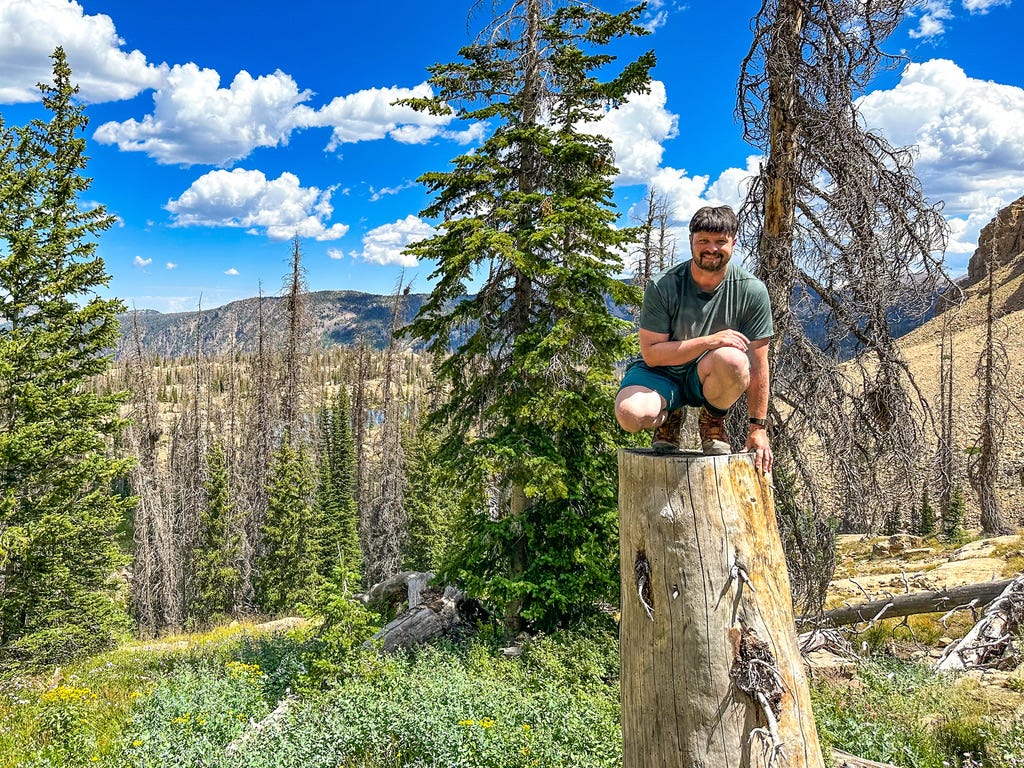The Flinch That Kills Connection Before It Can Breathe
The split-second recoil from being actually known
"How was your weekend?"
My coworker leans against the desk with that slightly expectant look that means she actually wants to know, and I realize that I spent Saturday discovering that I've been holding my breath during most conversations and had to practice talking while actually breathing.
Which sounds WAY too weird to share with someone who just wants to make pleasant workplace conversation.
So I say, "Pretty quiet, caught up on some reading," and watch the moment die.
This isn't about oversharing at work. This is about the split-second allergic reaction we have to being real with other humans. The way we've trained ourselves to snuff out connection before it can take its first breath.
The flinch is multifaceted, and happens faster than we thought.
Someone moves toward genuine contact, and your whole system recoils. Chest tightens. Throat closes. You retreat into acceptable before you can even register what's happening.
We've become good at killing these moments before they can become real.
The Breath We Don't Know We're Holding
The breathing thing is real. Part of my brain injury rehabilitation was literally relearning how to coordinate speaking with oxygen intake, which sounds ridiculous until you try having a conversation while forgetting to breathe.
I spent weeks practicing the most basic human interaction: talking while staying alive.
But here's what all that remedial breathing taught me: I'd been suffocating myself in conversations for years before the accident. The injury just made visible what my nervous system had been doing automatically: protecting itself from the metabolic cost of being fully present with another person.
It turns out that emotional contact requires permeability. And permeability is terrifying when you've spent decades perfecting your ability to be safely impenetrable.
The Beautiful Suffocation of Safety
Here's what I've been watching myself do:
Someone asks what I actually need and I immediately redirect to what they need.
A friend says something genuine about who I am and I deflect with humor before the words can land.
A colleague shares something difficult and creates space for me to do the same, so I fill that space with questions about them instead.
Each time, there's this micro-moment of potential contact. A door opening between two nervous systems that could actually meet each other.
Then the flinch. That immediate, automatic contraction away from the possibility of being influenced by someone else's reality.
Not because they're unsafe. Because contact itself feels like dissolution. Like losing the careful shape you've worked so hard to maintain.
We don't pull back from the possibility of being hurt. We pull back from the possibility of being changed.
The Radical Threat of Being Known
Last Tuesday, someone complimented my writing in a way that cut through all my careful self-deprecation. Not the general "great piece" kind of feedback, but specific recognition of something I'd tried to express that I wasn't sure had actually come through.
I felt my throat close before I could joke it away. Felt my chest contract before I could deflect attention back to them. The urge to dissolve the moment before it could become real contact was overwhelming.
This is the thing about genuine appreciation: it's not comfortable. It requires you to exist without armor for long enough to let someone see you clearly. To be witnessed in your actual competence instead of your performed humility.
Being truly seen feels like standing in bright light after years of carefully controlled exposure.
But here's what happened when I breathed instead of deflected: "Thank you," I said.
And meant it. I let their recognition exist without immediately neutralizing it with self-criticism.
The moment lasted maybbbbbeeeeee ten seconds. But in those ten seconds, something passed between us that felt more real than months of appropriate, professional interaction.
This is what connection actually is: two people staying present to each other's reality without immediately managing it.
The Allergy to Being Fed
We've confused needing people with weakness instead of recognizing it as information about what it means to be human.
I watch friends perform emotional self-sufficiency like it's a spiritual practice.
Always listening, never needing to be heard. Always offering support, never accepting it. Always showing up for other people's difficulties while handling their own struggles in private.
This isn't strength. This is starvation dressed up as independence.
The friend who texts when they're struggling but then deflects the moment you try to actually be there. The colleague who asks how you are but visibly contracts when you give them a real answer. The family member who creates space for everyone else's feelings but treats their own needs like classified information.
We've made emotional hunger shameful instead of recognizing it as the most basic requirement for staying alive in relationship.
The Contact That Changes You
Real intimacy isn't about sharing your feelings. It's about letting someone else's reality reorganize something inside you without immediately trying to reorganize yourself back.
The conversation that left me feeling simultaneously more known and more uncertain about who I thought I was. The friend whose way of being in the world challenged assumptions I didn't realize I was making. The colleague whose honesty about their struggles made me recognize how much I'd been editing my own experience.
This is why we flinch. Not because contact might hurt us, but because it will definitely change us. Because letting someone else's experience matter to you means your nervous system has to expand to hold more than just your own reality.
Connection requires metabolic expense. It costs something to care about another person's experience while simultaneously existing in your own.
We've been trained to see this cost as too expensive instead of recognizing it as the price of staying alive in relationship.
The Practice of Staying Present
I've been experimenting with not flinching. Not trying to overcome the impulse or push through it, but just noticing it. The moment when someone moves toward genuine contact and my system automatically starts the process of withdrawal.
The breath that wants to be held when conversation reaches emotional territory. The throat that wants to close when someone asks what I actually need. The chest that wants to contract when genuine appreciation comes my way.
Yesterday, a friend called upset about something and I felt the familiar urge to immediately start problem-solving instead of just being there. But I caught the flinch before it could kill the contact. Stayed present to his experience without trying to fix it or manage it or make it more comfortable for either of us.
"That sounds awful," I said. And let it be awful instead of trying to make it better.
This is what staying present looks like: breathing through the discomfort of not managing what's happening between you and another person.
The Intimacy That's Already Available
The contact you're avoiding is already there. The friend who sees through your performance. The colleague who notices when you're struggling. The person who keeps showing up even when you keep deflecting.
Your nervous system is scanning for threats while your heart is aching for connection with people who've already decided you're worth knowing.
The flinch will happen.
You just have to breathe through it long enough to discover what happens when two people stay present to each other without immediately trying to make it safer.
Stop suffocating yourself in conversations with people who actually want to know how you are.
The contact is there. The question is whether you're brave enough to stop killing it before it can live.
If Life As I See It resonates with you and you think others might find value in it too, consider recommending this publication to your readers or sharing this piece with someone who needs to read it.
About Alex
I’m Alex Lovell — political psychologist, yoga therapist, and writer.
Lived homeless. Been divorced. Survived a seven-car pileup with a semi. Fell in love with questions that don’t have easy answers. I’ve met a lot of thresholds. Even the one before death.
These days, I split my time between research, writing, and holding space for people figuring out who they are after everything shifted.
This Substack is where I make sense of things out loud.
I write for people in transition — between roles, beliefs, relationships, selves.
The ones quietly wondering, “What now?” but allergic to one-size-fits-all answers.
Sometimes I quote research. Sometimes I quote my own nervous system.
One speaks in data, the other in sensation. I’ve stopped choosing sides.
Free subscribers get weekly articles and insights (sometimes twice a week!). Paid subscribers get the Thursday Offerings, seasonal companion pages, post-nidra audio, and live slow sessions. Join me?






Alex - I rather like how you point out that when we “flinch” it's usually something deeper than our fear of being hurt but more the fear of being changed. Your thoughts leave me wondering how many times I end up redirecting or deflecting in a day without realizing what I am really avoiding. Your point about emotional hunger being mislabeled as weakness especially struck me.
Your piece serves as a reminder for me today, and going forward to stay present, to notice automatic responses, and to be compassionate when I can't stop myself from succumbing to the old patterns. It's a lifelong process for me to rewrite the old neural pathways that my brain has created to keep me safe, which no longer serve me.